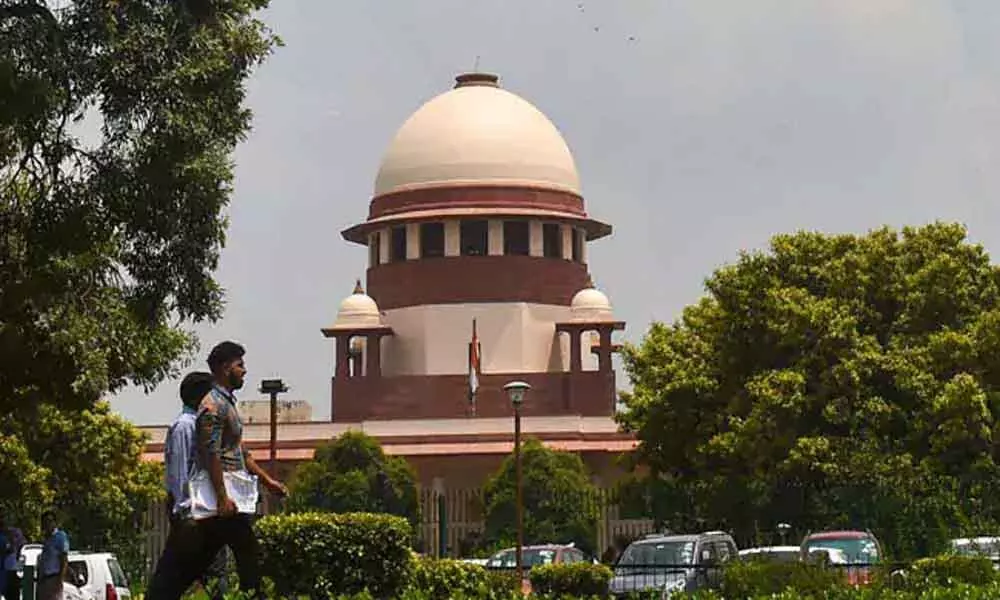Live
- Exhilarating ‘Benchmark’ of Venkat Changavalli
- Development activities worth `30 cr launched in Puthalapattu constituency
- Allegations against KTR baseless: BRS leader
- Megastar Chiranjeevi to Visit Allu Arjun’s Residence at 12 PM Today
- Nilima Rane: Trailblazer in Nursing
- Casual yet stylish office outfits for all-day comfort
- TTD to suspend all special darshans from January 10 to 19 amid Vaikuntha dwara darshans
- Naidu pats TDP leaders, cadres for enrolling 73L members
- Rupali Ganguly says for 20 years she never got an award
- Advanced anti-drone systems deployed for devotees’ safety at Mahakumbh
Just In
SC seeks Centre's response on uniform adoption, guardianship law


Supreme Court
The Supreme Court on Friday sought response from Centre on a PIL seeking gender and religion-neutral uniform law of adoption and guardianship for all citizens.
New Delhi: The Supreme Court on Friday sought response from Centre on a PIL seeking gender and religion-neutral uniform law of adoption and guardianship for all citizens.
Advocate Ashwini Kumar Upadhyay, in the plea, argued that state has failed to provide uniform grounds of adoption and guardianship for all citizens. "The Court may direct the Law Commission of India to examine the laws of adoption & guardianship and suggest 'Uniform Grounds of Adoption and Guardianship' in the spirit of Articles 14, 15, 21, 44 within 3 months while considering international laws & international conventions," it said.
A bench, headed by Chief Justice S.A. Bobde, after a brief hearing in the matter, issued the notice on the plea. Upadhyay was represented by senior advocates Anjana Prakash and Geeta Luthra.
The plea urged the top court to remove the anomalies in the grounds of adoption and guardianship and make them uniform for all citizens without discrimination on the grounds of religion, race, caste, sex or place of birth. Upadhyay cited that even after 73 years of independence and 71 years of India becoming a democratic republic, Muslims, Christians and Parsis don't have adoption laws.
"Due to lack of a common-law for all, Muslims, Christians, Parsis approach the court under the Guardians and Wards Act 1890. Muslims, Christians and Parsis can take a child under the said Act only under foster care. Once such a child becomes major, he can break all his relations," his plea said.
The plea argued that Muslims are bound to follow Kafala system under which a child is placed under a Kafil (guardian) who takes care of child's upbringing, marriage, well-being but the child continues to remain the descendant of his biological parents and not adopted. "An adopted child cannot inherit the guardian's property and retains his biological name. If child's family is not known, only then he can carry the name of the adoptive family whereas in Hindu law adopted child turns to be the child of his or her adoptive father or mother for all purposes with effect from the date of the adoption," the plea argued.
The plea contended that the current practice of adoption is discriminatory on its very face as Hindus have codified law of adoption but Muslims, Christians, and Parsis do not have.
The petitioner submitted that adopted child by Hindus turns equivalent to a biological child of adoptive parents whereas its opposite in Muslims, Christians and Parsis. "Adoptive parents can be the natural guardian of the adopted son and his wife under Hindu Law but not in Muslim, Christian and Parsi Law," added the plea.

© 2024 Hyderabad Media House Limited/The Hans India. All rights reserved. Powered by hocalwire.com






